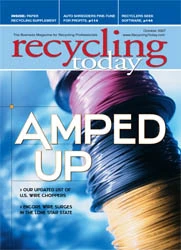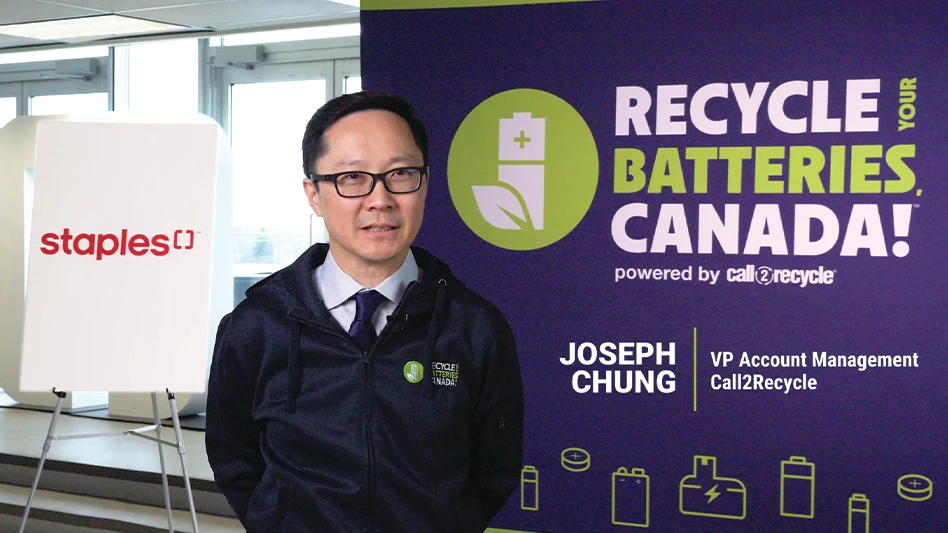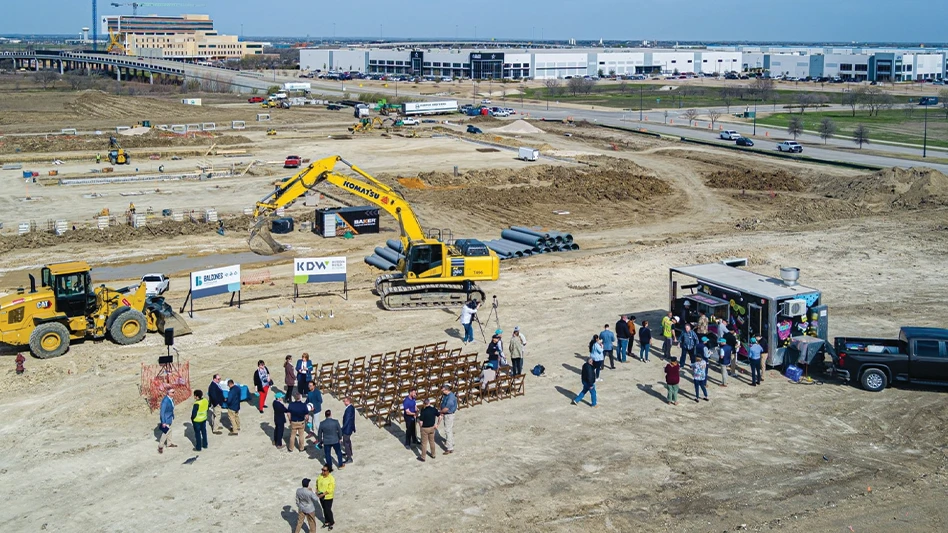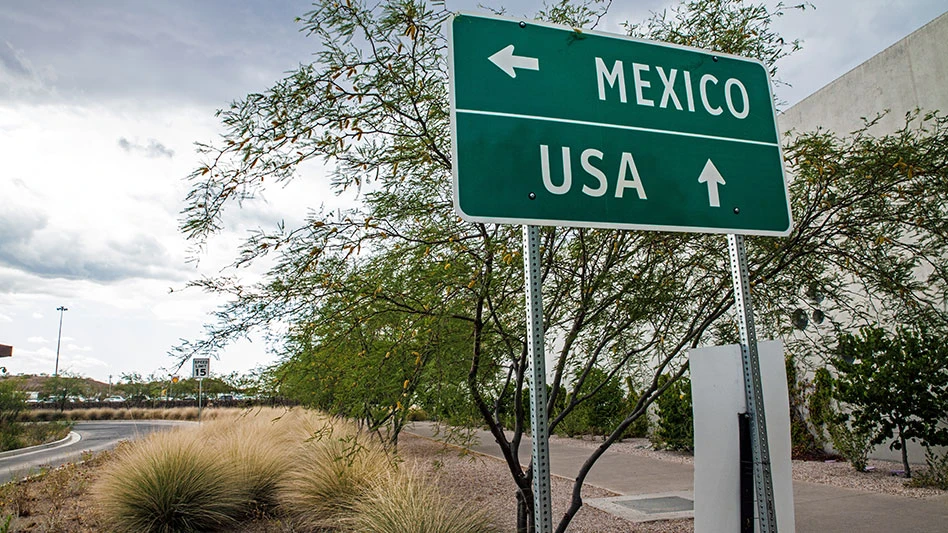Without the forest resources of states such as Wisconsin, Georgia or Washington, the state of Nebraska has never been a paper industry giant.
During the 1980s and 1990s, however, recycling advocates and economic development officials were determined to jump start the Cornhusker State’s paper industry, with an eye toward helping fund a paper mill.
Before a mill could be built, however, planners determined that the state’s
|
FIRSTAR FIBER AT A GLANCE |
|
Principals and Key Managers: Dale Gubbels, CEO; Brian Gubbels, president; Lee Cornell, recycling markets manager (pictured, on left); Jay McDowell, commercial sales director (pictured, on right) Locations: Headquarters and plant in Omaha, Neb. No. of Employees: 100 Equipment: Sorting system featuring screens made by Bulk Handling Systems (BHS), Eugene, Ore., and conveyors made by Karl Schmidt & Assoc., Commerce City, Colo., and Wildcat Mfg., Freeman, S.D.; extrusion-style baler made by American Baler Co., Bellevue, Ohio; two-ram baler made by Excel Mfg., St. Charles, Minn. Services Provided: Recycling of all grades of paper, with ONP and OCC as the largest grades by volume, and recycling of post-consumer plastic, metal and glass containers; paper converting operation that focuses on commercial tissue and towel products |
In the ensuing decade, the company has grown from a minor processor to a large, vertically integrated company that recycles a variety of materials and also runs a paper converting operation.
QUICK STARTERWith its more than 200,000 square feet of plant space and its ability to process more than 8,000 tons per month of recyclables, Firstar Fiber has the footprint of a recycling company that has been decades in the making.
But the company was created just 10 years ago when brothers Dale and Howard Gubbels and Howard’s son Brian founded Firstar Fibers, working from a 9,000-square-foot building located in Fremont, Neb.
Previously, Dale had gained recycling knowledge in his jobs with the Nebraska Department of Environmental Quality, as a recycling consultant and in his tenure as president of the National Recycling Coalition (NRC).
|
A WELCOME SPIKE |
|
Firstar Fiber Corp., Omaha, Neb., was recently recognized within its local market with the presentation of a 2007 Golden Spike Award by the Greater Omaha Chamber of Commerce. The award, given "to honor businesses that have contributed significantly to the economic vitality of the Greater Omaha community," was presented to Firstar in an early August breakfast ceremony. Firstar was one of six Omaha area companies to win a Golden Spike award in 2007. In addition to receiving a statuette, Firstar also garnered a write-up in the Chamber’s newsletter that detailed the company’s history of growth and expansion, as well as its role and the role of the recycling industry as part of Omaha’s overall economy. "Many communities and businesses are beginning to realize that they can now afford to recycle and thus take advantage of short-term gains and prevent long-term problems," Firstar Fiber President Brian Gubbels tells the Chamber for the story. "In the short term, businesses and communities gain the direct financial benefit of Firstar Fiber’s ability to market recyclables worldwide," Gubbels continues. "But that’s not all. When people recycle, they are creating jobs, as well as diverting the high long-term costs of compacting the materials and placing them into a hole for many years to come. We like to say that the job you create when you recycle may be your own." More information is available at the company’s Web site www.firstarfiber.com. |
After the recycling company added tissue and towel converting operations, it required even more space, which it found in leased space near downtown Omaha.
Firstar’s biggest geographic move came in 2004, when it acquired a 330,000-square-foot former retail distribution center located on a 26-acre parcel in Omaha.
Currently, Firstar uses about 90,000 square feet of this space for paper recycling and materials recovery facility (MRF) operations, some 110,000 square feet for its paper converting processes and another 10,000 square feet as office space. (Other space in the building is leased to tenants.)
The company has grown in volume and has also added key personnel throughout this decade, such as recycling market manager Lee Cornell and Jay McDowell, commercial sales director for the company.
Firstar has also reached into the towel and tissue industry with some recent hires, including new Chief Financial Officer Jim Goffi and board members Bob Schragel and Bob Antonucci, all of whom are veterans of the Scott Tissue organization.
PAPER PLUSWith the word "fiber" in its name, Firstar’s focus on paper traces back to its origins and the vast majority of its early activities.
Paper recycling and the commercial towel and tissue converting businesses remain the large volume and large revenue aspects of Firstar.
Additionally, though, the company has set up a MRF within its spacious plant to handle curbside recyclables including aluminum and steel cans and plastic bottles and jugs.
Haulers serving the municipal recycling programs in Omaha bring material to the Firstar MRF, as do haulers from throughout Nebraska and western Iowa.
On the commercial collection side, Cornell and McDowell indicate that material makes its way in from as far as Kansas City, southern Minnesota, South Dakota and even Chicago.
In an era of high fuel prices, bringing in material from far afield can require strategic thinking, says Cornell. "The transportation costs will kill you, but if you find the right way to incentivize your customers, you can overcome that," he comments.
One way Firstar does this is by offering single-stream collection for commercial customers, who can recycle their bottles and cans along with their office paper, their cardboard or anything else recyclable that might be generated at their workplace.
"With our commercial customers, we can endear ourselves with them by taking additional material like shrink and stretch wrap," says McDowell. "They generate a lot of that."
Handling containers from municipal programs and commercial customers can be good for business, especially when secondary commodity prices are strong. "There is good revenue with the plastic and the aluminum," says Cornell, who adds that the incoming volume of such material has also been healthy. "From Nebraska, the volume is very good, and even in Iowa (which has a deposit and return law) we will get a lot of HDPE and PET that still ends up in the recycling bin."
By collecting the additional commodities, Firstar still makes progress toward its original goal of harvesting more paper from its Midwest market region.
"We felt we could adapt the single-stream equipment to handle this single-stream commercial material we were collecting," Cornell says. "We knew we could get more office paper that way, but we’ve been shocked by how much office paper has not been captured by any recycler," he adds.
Cornell estimates Firstar’s current mix of paper as consisting of as much as 40 percent ONP, 20 percent OCC and the rest a mix of high grades that includes office paper and printers’ scrap, as well as shredded paper from document destruction operations.
POSITIVE DIRECTIONIn its 10 years in existence, Firstar has gained attention in Omaha in part for its business growth. This summer, the company was honored by the
|
IN THE NEWS |
|
When Newsweek columnist Daniel Gross looked for recyclers to learn from about the Chinese export phenomenon, among those he talked to was Lee Cornell of Firstar Fiber Corp., Omaha, Neb. In a September 2007 column by Gross, several scrap metal and paper recyclers were quoted, with an emphasis on the amount of material that they were now shipping to China. Cornell told Gross in part, "The additional revenue [from increased commodity prices] that’s now available has allowed us to dig further in the waste stream and get more material." Additional comments that Cornell made noted how the company’s single-stream collection method in office buildings and commercial plants had helped increase Firstar’s collection volume at such properties. Firstar continues to send material to paper mills and other consuming destinations in the United States to such manufacturers as International Paper, Cascades and SCA North America. But Cornell also told Recycling Today that Firstar’s location in Omaha, a historic rail hub and the home to Union Pacific railroad, also makes access to markets in China and other parts of East Asia affordable. "We are able to do a great deal of exporting through the Port of Long Beach, via rail," he comments. |
Additionally, the company has also earned praise for its role in training and employing visually impaired people in Firstar’s paper towel and tissue converting operations.
Firstar has an arrangement that involves being considered as a favored supplier of tissue and towel products to federal government facilities because of its role as an employer of visually impaired individuals hired through an outside agency in Omaha that seeks jobs for the visually impaired.
The program is not without its challenges. "You have to configure your operations a little differently," says McDowell. "Floor mats must remain in the same place because they are used as important guiding points, and forklifts are not allowed to operate at all in certain areas," McDowell offers as examples.
Beyond the challenges, though, has been the reward of seeing sightless individuals become a vital part of the Firstar workforce. "The neat thing is that each shift has really developed a team spirit," says McDowell. "Sighted individuals with cars pick up some of the visually impaired team members on the way to work—it has been neat to see these teams develop."
Ensuring good employee morale is a key part of Firstar’s future success, according to President Brian Gubbels. Regarding production employees and other employee incentives, "We want our employees to feel appreciated and share in the rewards of their efforts," Gubbels recently told the Greater Omaha Chamber of Commerce for a write-up that the organization prepared.
In the near-term, Firstar has plenty of opportunities to keep its 100 employees and 200,000 square feet of space fully occupied, says Cornell. "In the short and mid-term, our mission is to grow our commercial business and boost participation in the Omaha curbside program," he comments.
"There is so much opportunity out there that having the right direction and the right people to execute those opportunities should yield good results," Cornell concludes.
The author is editor in chief of Recycling Today and can be contacted at btaylor@gie.net.

Explore the October 2007 Issue
Check out more from this issue and find your next story to read.
Latest from Recycling Today
- SABIC’s Trucircle PE used for greenhouse roofing
- Hydro to add wire rod casthouse in Norway
- Hindalco to invest in copper, aluminum business in India
- Recycled steel price crosses $500 per ton threshold
- Smithers report looks at PCR plastic’s near-term prospects
- Plastics association quantifies US-EU trade dispute impacts
- Nucor expects slimmer profits in early 2025
- CP Group announces new senior vice president






